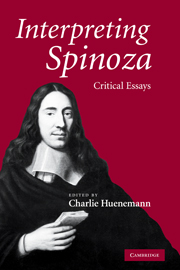Book contents
- Frontmatter
- Contents
- Notes on contributors
- Method of citation
- Introduction
- Chapter 1 Representation and consciousness in Spinoza's naturalistic theory of the imagination
- Chapter 2 Rationalism run amok: representation and the reality of emotions in Spinoza
- Chapter 3 “Whatever is, is in God”: substance and things in Spinoza's metaphysics
- Chapter 4 Necessitarianism in Spinoza and Leibniz
- Chapter 5 Epistemic autonomy in Spinoza
- Chapter 6 Spinoza and the philosophy of history
- Chapter 7 Democracy and the good life in Spinoza's philosophy
- Chapter 8 Spinoza's unstable politics of freedom
- Chapter 9 Should Spinoza have published his philosophy?
- Bibliography
- Index
Chapter 8 - Spinoza's unstable politics of freedom
Published online by Cambridge University Press: 22 September 2009
- Frontmatter
- Contents
- Notes on contributors
- Method of citation
- Introduction
- Chapter 1 Representation and consciousness in Spinoza's naturalistic theory of the imagination
- Chapter 2 Rationalism run amok: representation and the reality of emotions in Spinoza
- Chapter 3 “Whatever is, is in God”: substance and things in Spinoza's metaphysics
- Chapter 4 Necessitarianism in Spinoza and Leibniz
- Chapter 5 Epistemic autonomy in Spinoza
- Chapter 6 Spinoza and the philosophy of history
- Chapter 7 Democracy and the good life in Spinoza's philosophy
- Chapter 8 Spinoza's unstable politics of freedom
- Chapter 9 Should Spinoza have published his philosophy?
- Bibliography
- Index
Summary
Spinoza maintained that the state should accommodate, and even encourage, personal freedom. According to the Theological-Political Treatise, the appropriate constitution for such a state is democratic. According to the Political Treatise, a kind of monarchy and kinds of aristocracy can also make room for free human beings. But these forms of government were not supposed to be very close to actual or typical political arrangements in Spinoza's day. In typical monarchies and aristocracies, Spinoza suggests, the need for obedience could be overdrawn, and power could be over-concentrated in one man, or in a council of patricians drawn from too few families or too few places.
All of these claims put Spinoza's political philosophy in conflict with one of its main sources: namely Hobbes's theory of the state and of the state of nature. Hobbes holds that when sovereignty is vested in an assembly, democratic or aristocratic, it is liable to be divided and disunited, and he associated disunity with war, that is, with the absence of political order. He thought many actual states were internally unstable because power was not concentrated enough. The purpose of sovereignty, according to Hobbes, is collective security, and this is best achieved if each of the many give up self-rule and submit to an undivided, all-powerful lawmaker. Submission is what Hobbes reduces citizenship to. He does not think it is for subjects to use their judgment in deliberation over common purposes. Instead, subjects are vehicles for the sovereign's will in everything the sovereign's legislation touches.
- Type
- Chapter
- Information
- Interpreting SpinozaCritical Essays, pp. 147 - 165Publisher: Cambridge University PressPrint publication year: 2008

